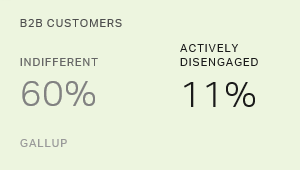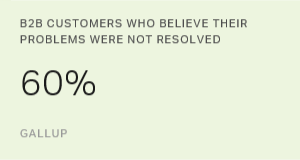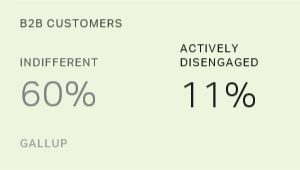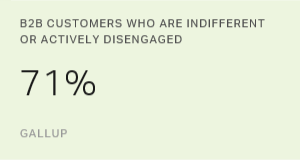Story Highlights
- Only 29% of B2B customers are fully engaged
- B2Bs need to view business through their customers' eyes
- Quantitative analyses help evaluate the strength of a relationship
If business-to-business (B2B) companies don't change the way they work with clients, they could lose more than two-thirds of their customer base.
Gallup analysis has found that only 29% of B2B customers are fully engaged -- that is, emotionally and psychologically attached to the companies with which they do business.
The remaining customers are either indifferent (60%) or actively disengaged (11%), and are ready and willing to take their business elsewhere.

This pattern holds true for every type of enterprise Gallup has studied. From heavy manufacturing to pharmaceuticals to law firms, B2B companies across all industries are at risk of being replaced -- not because of their products or prices, but because they are failing their customers.
Building a Customer-Centric Model
B2B companies may have inherent advantages over their competitors, such as their name and reputation or the size and breadth of their geographic footprint. And it may be difficult for their clients to shift their business to another company because of the costs involved with switching.
But there is often little in the company's product or service itself that helps it support long-term business growth. Ultimately, that growth will require a different approach.
Simply put, it's no longer enough for companies to view the world from their vantage point. They need to see the world through the lens of their customers.
A customer-centric model is about more than focusing on the customer or having a defined customer experience; it is about putting the customer at the core of everything. The goal of this model is to make the client organization more successful, both within its own business and within the context of its partnership with the company.
Although an increasing number of B2B companies realize they need to be customer-centric to compete in today's market, few have figured out how to put this model into use. They invest in Lean, Six Sigma and other methodologies that are crucial for keeping costs down, but they don't have a plan for maximizing their customer relationships. And sure, they may have mechanisms in place that tell them how they rate with their customers, but those surveys tend to be nothing more than formalities. B2B companies are missing the vital link between data and action.
Gallup sees this scenario play out repeatedly. The right survey or interview is instrumental in helping companies gauge the health of their customer relationships. Those data, however, rarely find their way out of a spreadsheet. And companies are either apathetic or unsure about what to do with the information they have gathered.
But their disregard has consequences. When customers share their thoughts and opinions, they expect to see change. If they tell their vendor that on-time delivery is an ongoing issue, they rightfully assume that the vendor will take steps to fix its delivery process. If the vendor does nothing, its customers will become further disengaged and will not take the company or any of its future surveys seriously.
Ignoring the voice of the customer can be exponentially more harmful than not asking for feedback at all. Companies must listen to -- and act on -- their customers' needs and wants. Commitment and follow-through provide the basis for customer centricity.
What B2B Companies Can Do to Improve Customer Engagement
Measure objectively. Companies need an impartial third party to help them assess their customer engagement. Although the account manager or salesperson is likely closest to the customer, it is best to gather feedback through an objective survey. The account team members, however, should be the champions of the survey and initiative. They should actively participate in educating customers about the survey process and outcomes and encourage them to provide open, honest responses.
Measure holistically. Few organizations take a holistic approach to understanding their customer relationships. They can only gain an accurate understanding of their customer relationships through quantitative and qualitative analyses. A quantitative analysis provides a high-level overview of where an account stands, while a qualitative analysis sheds light on the "why." Companies should conduct customer interviews -- again, through an objective third party -- to better understand why certain scores are high or low.
Focus on the most urgent accounts. Companies should concentrate on their most important accounts to realize the greatest return on their investment of time and resources. Previous Gallup analysis has found that low engagement scores are an indicator of future financial decline. As such, companies should use their engagement survey results to identify their at-risk accounts and prioritize those that need immediate action.
Activate the account team. Armed with the results of the quantitative and qualitative analyses, account team members can build strategies aimed at supporting engagement and generating customer impact. They must act on the feedback from the survey to show customers they are doing something productive with it. Otherwise, the company and the survey initiative come off as insincere.
Put customers first. Too often, companies think about their needs first and their customers' needs second. They motivate account team members through incentives and goals that inadvertently force them to compete with one another. This oversight prevents teams and team members from working together for customers' benefit. If companies want to become their customers' trusted advisers and partners, they must put their customers at the core of their business strategy.




